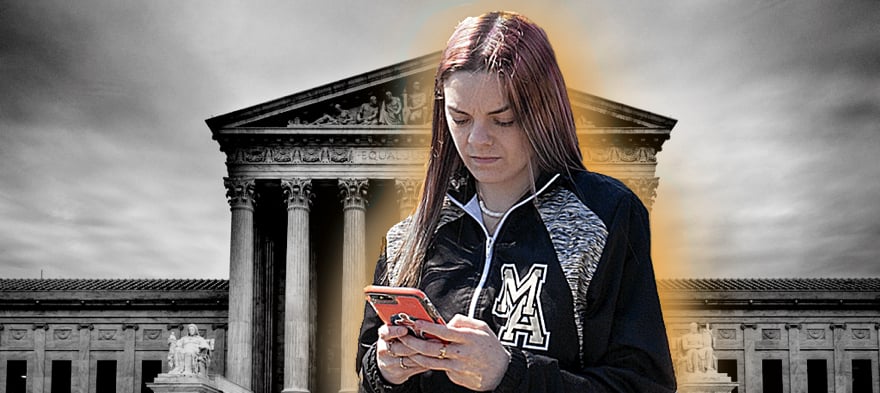
Jul 2, 2021 12:00:00 AM
Usually, I start my mornings by watching reruns of my favorite 90s sitcoms like Living Single and Martin, but on this day, my eyes were glued to The View. Admittedly, I’m not a huge fan of the famous morning talk show, but the educator in me told me to tune in for their “Hot Topics” discussion on the Supreme Court’s recent ruling of a case involving Brandi Levy.
Levy sued her former high school for violating her First Amendment rights when the school suspended her from the junior varsity cheerleading team for going on a profanity-laced rant on social media to express her frustration over not making the varsity team. Last week, the Supreme Court ruled in Levy’s favor, citing that public schools do not have the general power to govern off-campus student speech.
Granted, Levy’s choice to broadcast her frustrations on social media was poor judgment on her part, but I still agree with the Supreme Court’s ruling. As a middle school teacher, I’m all for young people having an outlet to express how they feel about school-related matters. It would be totally naïve for me to think that my students have never talked shit about me behind my back or on the bus ride home.
As a matter of fact, I’ve had former students openly admit to partaking in such shit-talking to release their frustration. It’s similar to how we, as teachers, sometimes come home from work after a rough day and rant to our loved ones about certain co-workers or students who get on our damn nerves. That’s just human nature!
On another note, [pullquote]I couldn’t help but think about the ruling’s impact to potentially empower more of our young people to openly speak up about issues of systemic racism within their schools.[/pullquote] As optimistic as I am about that possibility, I’m equally fearful of the ruling’s potential to police the prevalence of anti-racist messaging (both verbal and non-verbal) and open the floodgates for more hate speech.
Given the nuances of the First Amendment’s language around freedom of speech, I think it’s fair to pose the following question: [pullquote position="right"]Will the free speech ruling be weaponized by educators, districts, and stakeholders to maintain white supremacy culture in our schools?[/pullquote]
The Levy case is not the Supreme Court’s first ruling on free speech in public schools. The Court has historically ruled many of these cases in favor of the students. For instance, the landmark Tinker v. Des Moines case, which broadened students’ free speech rights protections to include symbolic speech, established that schools cannot punish students for freedom of speech without proving that it caused substantial disruption on school grounds. A few years later, the Supreme Court clarified that schools didn’t have to wait for an actual disruption to occur but rather, they must be able to provide a “reasonable forecast” of substantial disruption. In other words, the speech must present a strong likelihood to cause a disruption.
In recent years, there have been several incidents mainly involving Black students who were exercising their First Amendment rights only to be severely punished by their schools/districts. As a result, this has led me to wonder if their rights to freedom of speech are truly honored and protected under constitutional law.
Students like India Landry and Mariana Taylor are being severely punished by their schools, as if the Barnette v. West Virginia ruling never existed. Students like Ben Stapleton and Latrell Taft are viewed as “segregationists” rather than young men celebrating their Black heritage through their shirts. The reality is that most white folx are fearful of any actions that pose a threat to white supremacy or bring about white discomfort, so it personally comes as no surprise that they would view these students’ actions as substantial disruptions to their school environments. Even so, I would argue that some disruptions are necessary at a time when racist behavior is often overlooked and the offending students are, at most, mildly chastised for their racist transgressions.
In the end, [pullquote]we can’t force America to live up to its promise of “liberty and justice for all” without the civic participation of our young people.[/pullquote] Yes, I’m hopeful that this most recent Supreme Court ruling on free speech will push more young people to speak out against racism in their schools and push for systemic change, but America’s track record with racism still leaves me a bit skeptical about the systemic change part coming to fruition. Nevertheless, I remain cautiously optimistic—and only time will tell how significant this ruling will be in our fight for racial equity in schools.
Kwame Sarfo-Mensah is the founder of Identity Talk Consulting, a global educational consulting firm that specializes in developing K-12 teachers into identity-affirming educators. Throughout his 17-year career as a classroom teacher, author, and consultant, Kwame has earned numerous accolades for this work, which include being honored as the 2019 National Member of the Year by Black Educators Rock, Inc. and being recognized as a Top Education Influencer by brightbeam, Inc. in 2021 and 2022. His newest book, "Learning to Relearn: Supporting Identity in a Culturally Affirming Classroom", is out now.
Few issues in education spark more tension and debate than standardized testing. Are they a tool for equity or a burden on students? A necessary check on school systems or a flawed measure of...
Charter schools are public schools with a purpose. Operating independently from traditional school districts, they're tuition-free, open to all students, and publicly funded—but with more flexibility...
Despite the benefits of a diverse teaching force, prospective teachers of color fall out of our leaky preparation pipeline at every stage: preparation, hiring, induction, and retention. Here’s what...
Ed Post is the flagship website platform of brightbeam, a 501(c3) network of education activists and influencers demanding a better education and a brighter future for every child.
© 2020-2025 brightbeam. All rights reserved.
Leave a Comment